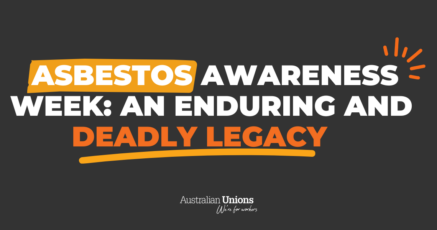If you feel you need a mental health day, you’re not the only one.
A mental health day is when you take the day off due to mental health related issues, rather than physical illness.
There is always support available. For 24 hour 7 day mental health support call:
-
Lifeline – 13 11 14
-
Beyond Blue – 1300 22 4636
-
Suicide callback service – 1300 659 467
More than one in five of workers said they suffered a mental health issue due to work in the 2021 Work Shouldn’t Hurt Survey. Employers and workers alike need to take mental wellbeing just as seriously as we would physical health.
Really, we shouldn’t have to think twice about taking a sick day when we want to look after our mental health. But if you have any doubts or simply just want to make the most of your day off, here are four tips that will come in handy.
1. Know your rights
Yes, a mental health day counts like a ‘sick day’. Whether it be unpaid or paid leave, you have a right to be absent from work if you are unwell.
All full-time workers have a right to take 10 personal leave (also known as sick leave) days per year under the National Employment Standards. If you’re under an Enterprise Bargaining Agreement, the numbers of days might be higher. Part-time workers also have personal leave days, with the number determined by how many days per week you work.
Some workplaces will require evidence of needing personal leave. If your employer requests a medical certificate, most GPs will be happy to provide you with one.
You may wish your employer to know you’re taking a mental health day, but if not, your GP can be as vague as noting a ‘medical condition.’ It’s up to you whether you want your GP to disclose the reasons for your absence, and how you have the conversation with your employer is up to you.
If you are a casual worker, you can still take sick leave, but it is unpaid. In Victoria, because of campaigning by unions, there is a trial by the Victorian Government to provide paid sick leave to casual workers. Find out more here.
Have questions about your leave entitlements? Talk to your union or give the Australian Unions Support Centre a call on 1300 486 466.
2. Build immunity to guilt-tripping
Don’t let your boss guilt you into working. If they’re short-staffed, that’s on them. Mental health is just as important as physical health, so you have a right to take time off if you’re unwell.
What makes the conversation with your manager even easier is you don’t need to provide details as to why you’re taking the leave. The same rules apply for physical illness: just saying ‘I’m not well and won’t be at work’ is usually sufficient.
You are not obliged to tell your employer your personal medical situation (and a decent employer won’t ask you).
3. Stay offline
Don’t work. No seriously, don’t.
Switch off work notifications on your phone. Resist the urge to check emails. Not only is it your right to disconnect while on personal leave, but it’ll also help you relax and recharge.
Even if you’re working from home, it is still worth taking the day off. Whether you’re at home or not doesn’t change the fact you’re unwell.
Plugging into work from home instead of taking a mental health day is just another form of presenteeism that may lead to worse mental wellbeing.
You can do what you like on the day – the aim to reset and recharge and recover.
And just because you’re taking personal leave doesn’t mean you have to stay at home. Go outside for fresh air, book appointments with health professionals as needed, or visit a favourite place that will help you relax and forget about work for the day.
4. Put in prevention measures
If you find your mental health is deteriorating due to work, there is something you can do about it.
One third of workers are regularly or always exposed to stress at work but not always for the reasons we might expect.
All employers have a duty of care to provide and maintain a safe working environment – and those responsibilities are just as important whether it is to protect physical or mental health. That means identifying work-related hazards that could lead to poor mental health for workers.
As a first step, it’s worth chatting to your Health and Safety Representative (HSR) at work about your concerns. Not to be confused with a safety officer (appointed by your employer), your HSR is elected by you and your colleagues. Their role is to represent workers’ in health and safety matters.
Psychological hazards can be a little tricker to identify compared to physical hazards (it’s a lot easier to point out an untied shoelace than more abstract risks to mental health). For that reason, the Mind Your Head campaign has resources for workers looking to ensure a healthy workplace.
Are you stressed because you’re not sure what your responsibilities are at work? Or do you feel constantly in a churn because of frequent structural changes?
Whether it be low role clarity, poor organisational change management or vicarious trauma, Mind Your Head has articulated everyday workplace experiences that may negatively affect our mental health that may not always be easy for us to identify and put into words.
The Mind Your Head resources are also helpful for Health and Safety Representatives who are there to keep your workplace safe and represent your work group or team when it comes to health and safety issues.
If you don’t have a health and safety rep, chat to your union for support. Not yet a member? The best time to join is now.
Cover photo credit: Zen Chung








SHARE:
Four tips for taking a mental health day